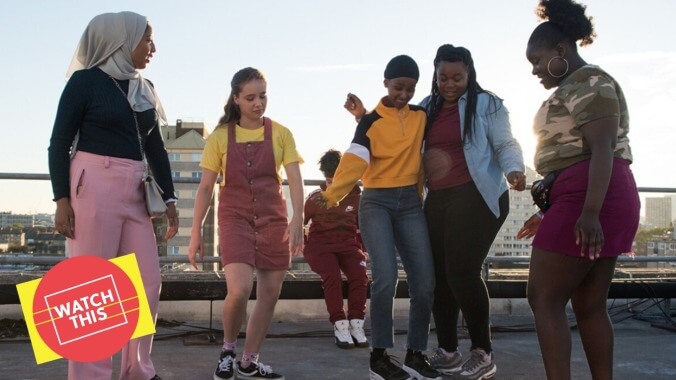A star is born in the nuanced, wonderfully acted coming-of-age- tale Rocks
Sarah Gavron's deeply felt coming-of-age film evokes the best of Ken Loach and Chantal Akerman
Film Lists Rocks
Watch This offers movie recommendations inspired by new releases, premieres, current events, or occasionally just our inscrutable whims. This week: 2021 is about half over, so we’re looking back on the best movies released this year that we didn’t review.
Rocks (2019)
Mother-daughter relationships have a uniquely variable place in coming-of-age cinema, as a source of absurdity (à la Amy Poehler’s “cool mom” in Mean Girls) or strife (the tension between Saoirse Ronan and Laurie Metcalf’s characters in Lady Bird). In the phenomenal Rocks, however, the intergenerational dynamic is one of absence: Who are we without the parent who society insists is supposed to love us unconditionally? Rocks’ (Bukky Bakray) mother has left her and her younger brother, and the siblings are adrift. Can they survive on their own? The result is a deeply felt film that evokes the class-based realism of Ken Loach and the unrelenting feminism of Chantal Akerman while furthering director Sarah Gavron’s nuanced interest in the complexities of female communities, all in a brisk 93 minutes.
Set in present-day Hackney, London, Rocks focuses on the titular teenager, who lives with her mother Funke (Layo-Christina Akinlude) and younger brother Emmanuel (the adorable D’angelou Osei Kissiedu) in a small high-rise apartment. Her closest friends are an array of fellow first-generation immigrants— Bangladeshi, Somali, Roma, Black and brown—and they’re well-aware of how white Londoners might view them. The film begins with the girls, some of whom wear hijab headscarves, exchanging the Arabic greeting “As-salamu alaykum.” Later on, they’ll joke about how passersby seeing their ethnically diverse group “must think we’re crackheads,” and they’ll be dismissively called “you people.” Knowing the racism and sexism they’re up against, the young women have stuck together since childhood—forming a safety net for each other that neither the government nor their neighbors fully provide.
But when Rocks’ mother leaves her children, the teen refuses to reach out for help. Gavron guides the character through a series of scenes that communicate her increasing recklessness, complementing them with the concerned reactions of those who love her. Rocks’ conflicted defensiveness and anger toward her mother plays out in a brief phone-card conversation with her Yoruba-speaking grandmother in Nigeria, during which Rocks bristles at her grandmother’s observation that “not every woman is cut out for motherhood.” Quick editing exacerbates the chaos of a food fight Rocks starts during class, while a brief glimpse of best friend Sumaya’s (Kosar Ali) quietly disappointed face suggests their fraying bond. And when Rocks begins to spend time with mischievous new classmate Roshé (Shaneigha-Monik Greyson), Gavron incorporates silly Instagram filters and vertical selfie compositions to emphasize Rocks’ purposeful frivolousness as forgetfulness.
Cinematographer Hélène Louvart’s camera floats through locations—the family’s cramped apartment, tightly packed classrooms, jammed buses—and links their claustrophobia with Rocks’s own feelings of helplessness. Meanwhile, Claire Wilson’s script, working off a story by Theresa Ikoko, both subverts expectations and speaks truthfully to the precariousness of living in the margins. And holding it all together is Bakray, giving a gritty, vulnerable performance as a young woman whose defensiveness protects a sincere desire to both love, and be loved.
Nominated for Best Actress and Most Promising Newcomer at the British Independent Film Awards and winner of the Rising Star Award at the British Academy Film Awards, Bakray builds Rocks into a character who is sympathetic and enraging in equal measure. While leading her dance class in a complicated routine, her confident steps are in contrast to her downcast eyes—she’s shy but proud. Her British accent grows more pronounced, and her line deliveries more clipped, during a fight with Ali’s Sumaya that leaves them both in silent tears. And the myriad emotions that play upon her face in the film’s final moments provide a wary hopefulness that supports the film’s ethos: Our greatest strengths come from our friends.
Rocks is unsentimental in many ways: It doesn’t ignore that both parents and bureaucratic systems can fail us. But the film’s understanding of the raw vulnerabilities of adolescence, and its nuanced take on the “growing up as a girl is hard to do” subgenre, makes Gavron’s follow-up to Suffragette one of the year’s best.
Availability: Rocks is streaming on Netflix.
9 Comments
This movie’s the best. It’s true that the acting by these kids really makes the movie. The two leads (Bakray and Ali) are really something to watch.
oh my, yes. this movie sounds awesome.
This movie’s the best. It’s true that the acting by these kids really makes the movie. The two leads (Bakray and Ali) are really something to watch.
I can’t seem to find a rating. Can I watch it with my mature preteen girls?
Every parent’s standard is going to be different, but I think so, yeah.
It’s a 12 in the uk – here’s the BBFC (uk rating body) warnings. It’s deeply brilliant and the script was developed in improv during the workshops where they gradually winnowed down the actors
https://www.bbfc.co.uk/release/rocks-film-qxnzzxq6vlgtmta1nzcymw
Is this a 2019 film, or was it “released this year”?
2019 at festivals, august 2020 in cinemas.
And neither of those is 2021. I guess if it was released near the end of 2020 then maybe it was still in theaters.